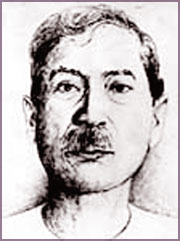Dhanpat Rai alias Premchand
Compiled by Ishara Mudugamuwa
 Premchand whose original name was Dhanpath Rai Srivastava was born on
31 July 1880, in a village, Lamahi near Varanasi, India, where his
father was a clerk in the post office. At an early age, Premchand lost
both his parents and left with the responsibility of looking after for
his step-mother and step- siblings. Premchand whose original name was Dhanpath Rai Srivastava was born on
31 July 1880, in a village, Lamahi near Varanasi, India, where his
father was a clerk in the post office. At an early age, Premchand lost
both his parents and left with the responsibility of looking after for
his step-mother and step- siblings.
In his early life, Premchand faced immense poverty. He earned five
rupees a month, tutoring a lawyer's child. He was married at an early
age of fifteen but that marriage failed. For the second time, he married
a child widow Shivarani Devi. Premchand had three children, Sripat Rai,
Amrit Rai and Kamala Devi Srivastava.
Premchand passed his matriculation exam with great effort in 1898,
and in 1899 he took up a teaching job, with a monthly salary of eighteen
rupees. Later he worked as a deputy sub-inspector of schools in what was
then, the United Provinces.

In 1910, he was hauled up by the Jamirpur District Magistrate for his
anthology of short stories, Soz-e Watan (Dirge of the Nation), which was
labelled seditious. The first story of the anthology was Duniya Ka Sabse
Anmol Ratan (The Most Precious Jewel in the World), which according to
him was "The last drop of bloodshed in the cause of the country's
freedom." All the copies of Soz-e-Watan were confiscated and burnt.
Initially Premchand wrote in Urdu under the pseudonym, Nawabrai.
However, after the confiscation of Soz-e-Watam, he started writing under
a new name Premchand. Before him, Hindi literature consisted mainly of
fantasy or religious works. Premchand brought realism to Hindi
literature.
In 1921, he answered Mahathma Gandhi's call and resigned from his
government job. He then worked at a printing press and editor of
literary and political journals. Briefly, he also worked as a script
writer in the Bombay film world.
Some criticise Premchand's writings as full of too many deaths and
too much of misery. His stories represented the ordinary Indian people.
The main characteristic of Premchand's writings is his interesting
story-telling and use of simple language.
His novels describe the problems of rural peasant classes. He avoided
the use of highly Sanskritized Hindi. Premchand called literature, a
work that expresses the truth and experience of life impressively.
During his last years, he became terribly ill. This serious impact on
his health led to his early death on 8th October 1936, at the age of 52. |
